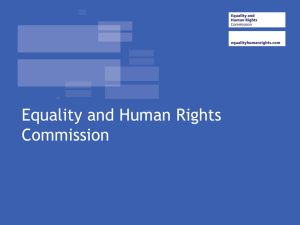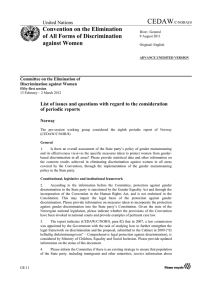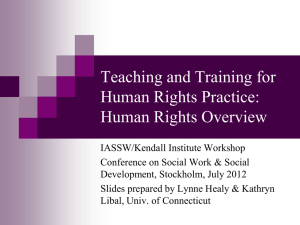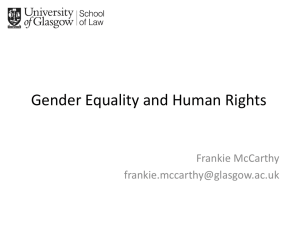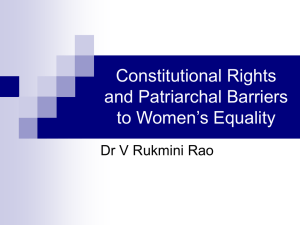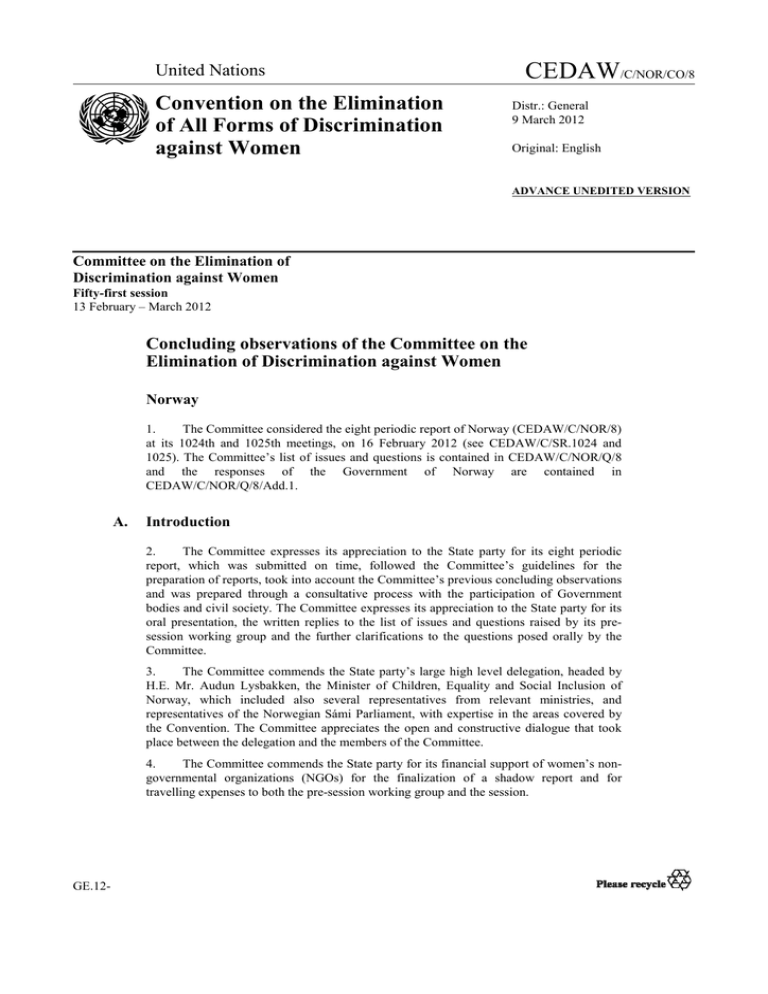
United Nations
Convention on the Elimination
of All Forms of Discrimination
against Women
CEDAW/C/NOR/CO/8
Distr.: General
9 March 2012
Original: English
ADVANCE UNEDITED VERSION
Committee on the Elimination of
Discrimination against Women
Fifty-first session
13 February – March 2012
Concluding observations of the Committee on the
Elimination of Discrimination against Women
Norway
1.
The Committee considered the eight periodic report of Norway (CEDAW/C/NOR/8)
at its 1024th and 1025th meetings, on 16 February 2012 (see CEDAW/C/SR.1024 and
1025). The Committee’s list of issues and questions is contained in CEDAW/C/NOR/Q/8
and the responses of the Government of Norway are contained in
CEDAW/C/NOR/Q/8/Add.1.
A.
Introduction
2.
The Committee expresses its appreciation to the State party for its eight periodic
report, which was submitted on time, followed the Committee’s guidelines for the
preparation of reports, took into account the Committee’s previous concluding observations
and was prepared through a consultative process with the participation of Government
bodies and civil society. The Committee expresses its appreciation to the State party for its
oral presentation, the written replies to the list of issues and questions raised by its presession working group and the further clarifications to the questions posed orally by the
Committee.
3.
The Committee commends the State party’s large high level delegation, headed by
H.E. Mr. Audun Lysbakken, the Minister of Children, Equality and Social Inclusion of
Norway, which included also several representatives from relevant ministries, and
representatives of the Norwegian Sámi Parliament, with expertise in the areas covered by
the Convention. The Committee appreciates the open and constructive dialogue that took
place between the delegation and the members of the Committee.
4.
The Committee commends the State party for its financial support of women’s nongovernmental organizations (NGOs) for the finalization of a shadow report and for
travelling expenses to both the pre-session working group and the session.
GE.12-
CEDAW/C/NOR/CO/8
B.
Positive aspects
5.
The Committee welcomes the progress achieved since the adoption of its last
concluding observations in 2007, including the legislative reforms that have been
undertaken and the adoption of a range of legislative measures and policies. Specific
reference is made to the:
a.
Incorporation of the Convention and its Optional Protocol into Human Rights
Act (Act relating to the strengthening of the status of human rights in Norwegian law 199905-21-30), which gives precedence in case of any conflict with domestic legislation (2009);
b.
Adoption of the first National Action Plan on Gender Equality 2011 – 2014
(2011) which specifically addresses the Convention and the State Party’s obligations under
it;
c.
Appointment of the commission to assess the existing gender equality
policies (2011);
d.
Adoption of the Action Plan to Promote Equality and Prevent Ethnic
Discrimination 2009 – 2012 (2009), containing measures to include minorities into the
labour market;
e.
Amendment of section 202a of the Penal Code, recognizing a purchase of
sexual activity or a sexual act from adults as a criminal offence (2009);
f.
Priority given to UN Security Council Resolution 1325 as part of the State
Party’s foreign policy; and
g.
The successful implementation of the rules concerning gender balance on
boards of both publicly and privately owned public limited companies, requiring gender
balance of at least 40-60 per cent of each gender on their boards.
6.
The Committee also commends the State Party for signature of the Council of
Europe Convention on the Elimination on Preventing and Combating Violence against
Women and Domestic Violence on 7 July 2011 and the commitment of the State party
expressed during the dialogue to ratify it.
C.
Principal areas of concern and recommendations
7.
The Committee recalls the obligation of the State party to systematically and
continuously implement all the provisions of the Convention and views the concerns and
recommendations identified in the present concluding observations as requiring the priority
attention of the State party between now and the submission of the next periodic report.
Consequently, the Committee urges the State party to focus on those areas in its
implementation activities and to report on actions taken and results achieved in its next
periodic report. The Committee calls upon the State party to submit the present concluding
observations to all relevant ministries, to the Parliament, and to the judiciary, so as to
ensure their full implementation.
Parliament
8.
While reaffirming that the Government has the primary responsibility and is
particularly accountable for the full implementation of the obligations of the State
party under the Convention, the Committee stresses that the Convention is binding on
all branches of Government, and it invites the State party to encourage the
Parliament, in line with its procedures, where appropriate, to take the necessary steps
with regard to the implementation of the present concluding observations and the
Government’s next reporting process under the Convention.
2
CEDAW/C/NOR/CO/8
Definition of gender discrimination and gender equality
9.
The Committee notes the upcoming White Paper and a Bill on the State Party’s
future gender equality policies aimed at adjusting existing anti-discrimination legislation
with an aim to harmonize the rules in different legal acts. The Committee is concerned at
the lack of guarantee or definition of gender equality in the State Party’s Constitution or
other appropriate legislation. The Committee is also concerned that the use of genderneutral legislation, policies and programmes, which might lead to inadequate protection of
women against direct and indirect discrimination and hinder the achievement of substantive
equality between women and men. Furthermore, the Committee is concerned at the lack of
attention, in some laws and policies, to the specific needs of minority groups of women,
including women with ethnic minority background and women with disabilities, often
leading to intersectional discrimination.
10.
The Committee calls upon the State party to:
(a)
Embody the principle of equality of women and men into the
Constitution or other appropriate legislation in accordance with Article 2 of the
Convention;
(b)
Adopt a more gender specific approach for its legislation, policies and
programmes; and
(c)
Raise awareness with respect to the nature of indirect discrimination and
the principle of equality for all women, including women from ethnic minority
background and women with disabilities, among Government officials, the judiciary
and the general public.
Visibility of the Convention and its Optional Protocol
11.
The Committee is concerned at the general lack of awareness of the Convention and
its Optional Protocol in the State party, in particular, among government officials, the
judiciary and other law enforcement officials; at the lack of case law, including Supreme
Court case law, referring to the Convention; and that it had not been included in the new
judicial training program mentioned by the Minister during the dialogue. It is further
concerned that women themselves, are not aware of their rights under the Convention, or of
the communication and inquiry procedures under the Optional Protocol, and thus lack the
necessary information to claim their rights.
12.
The Committee calls on the State party to:
(a)
Take the necessary steps to ensure the adequate dissemination of the
Convention, the Optional Protocol and the Committee’s general recommendations
among all stakeholders, including Government ministries, parliamentarians, the
judiciary jury and law enforcement officers;
(b)
Include the Convention, the views adopted on individual
communications and inquiries under the Optional Protocol and the Committee’s
general recommendations into judicial training programs; and
(c)
Intensify its efforts to raise awareness among women on their rights
under the Convention and the communication and inquiry procedures by its Optional
Protocol.
National mechanisms for the advancement of women
13.
The Committee welcomes the adoption of the first Action Plan for Gender Equality
for 2011 – 2014 (2011), and the establishment of a commission to assess gender equality
policies, strengthening the Equality and Anti-Discrimination Ombud’s and the Tribunal’s
mandate in relation to promoting gender equality and the advancement of women. The
3
CEDAW/C/NOR/CO/8
Committee, however, expresses its concern that neither the Equality and AntiDiscrimination Ombud nor the Tribunal are authorized to hear cases of sexual harassment.
14.
The Committee encourages the State party to:
(a) Further strengthen the Equality and Anti-Discrimination Ombud, by
providing it with adequate human and technical resources and consider authorizing
the Ombud and the Tribunal to hear cases of sexual harassment;
(b)
Strengthen its impact assessment of measures taken so as to ensure that
such measures achieve their goals and targets; and
(c)
Raise awareness about the Equality and Anti-Discrimination Ombud, in
particular, among women with a minority background.
National Human Rights Institutions
15.
The Committee is concerned that the Norwegian Centre for Human Rights, as a
university Institute, can no longer fulfil its mandate as the National Human Rights
Institution, and that it is about to be downgraded to B-status in October 2012 by the ICC
Subcommittee on Accreditation.
16.
The Committee encourages the Norwegian Government to initiate a speedy,
open and consultative process for the reestablishment of its National Human Rights
Institution in full compliance with the Paris Principles.
Temporary special measures and permanent measures
17.
The Committee commends the State party for the high level of participation of
women in many fields. However, the Committee regrets the decrease in the number of
women represented at local government level after the 2011 Municipal election (4115
women and 6670 men), compared to the outcome of 2007 elections, as indicated in the
delegation’s introductory statement. The Committee also reiterates its concern at the low
numbers of women professors in academia and of women judges at all levels of the
judiciary, and at the inadequate representation of women with minority backgrounds
therein.
18.
The Committee encourages the State party to:
(a)
Consider further adoption and implementation of measures, either as
temporary special measures or as permanent measures aimed at achieving substantive
equality of women and men in all areas;
(b)
Consider expanding the rules concerning gender balance on boards of
public limited companies to other types of enterprises and other areas of the private
sector; and
(c)
Enhance programmes of capacity building for women of minority
background to encourage their participation in public and political life.
Participation of women in peace process
19.
The Committee commends the State Party's commitment to the UN Security Council
Resolution 1325 including the launch of the Action Plan and its general financial support
for the implementation of this resolution in countries affected by conflict. However, the
Committee is concerned about the lack of a measurable impact on women on the ground in
conflict and post conflict countries, where women are continuously excluded from the
peace negotiations, security discussions and reconstruction processes.
4
CEDAW/C/NOR/CO/8
20.
The Committee encourages the State party to
(a)
Require full accountability on UN Security Council Resolution 1325 in
countries where Norway is supporting its implementation to ensure full participation
of women in peace negotiations, security and reconstruction processes;
(b)
Increase support to local women’s organizations and networks that are
active in peace initiatives and post-conflict reconstruction processes; and
(c)
Strengthen the activities under the Action Plan including constructing
effective tools for measuring its outcomes.
Stereotypes
21.
While welcoming the dialogue that the State Party’s Government opened with the
commercial and the fashion industry, the Committee is concerned about the omnipresence
of media-driven hyper-sexualised and commodified representations of girls and women,
potentially leading to gender discrimination of more violent nature, notwithstanding section
2 of the Marketing Control Act and the media’s code of ethics in confronting this.
22.
The Committee urges the State party to:
(a)
Conduct a study on the possible impact of over-sexualized representation
of girls and women in the media on increasing levels of gender based violence against
women;
(b)
Use innovative measures that target media people to strengthen
understanding of the equality of women and men and through the educational system
to enhance a positive and non-stereotypical portrayal of women; and
(c)
Monitor the measures taken in order to assess their impact and review
them, if necessary, in order to achieve the objectives of such measures.
Violence against women
23.
While welcoming the launch in January 2012 of a new Plan of Action to Combat
Domestic Violence and the establishment of the duty to contact the police or otherwise
attempt to prevent domestic violence (section 139 of the Penal Code), the Committee
expresses its concern at the high prevalence of violence against women in the State party, in
particular, domestic and sexual violence, including rape and, marital rape in some
communities, the high level of acquittals, the lenient sentences imposed on perpetrators
which may be partly attributed to lack of gender training of lay judges who serve as jury in
criminal cases, the absence of surveys and research on root causes of violence against
women. It is also concerned at the apparent lack of awareness among women that marital
rape is criminalized in the State party. The Committee reiterates its previous concerns at the
lack of a comprehensive law on prevention of violence against women. The Committee is
also concerned that the definition of rape contained in the General Penal Code, maintains
the requirement of the use of threat or force. While noting the adoption in 2009 of the new
Act relating to provision of municipal crisis centres (Crisis Centre Act), which directs all
municipalities to have a shelter for women, men and children victims of violence and abuse
in close relationships, the Committee is concerned that from 51 shelters, 22 shelters are for
men and 10 of them remain empty, apparently due to inadequate estimation of the needs for
this type of establishment, and that only half are accessible for women with physical
disabilities.
24.
The Committee urges the State party to:
(a)
Give high priority to the enactment of comprehensive specific legislation
on domestic violence, to put in place comprehensive measures to prevent and address
violence against women and girls, including marital rape, to ensure that perpetrators
are prosecuted and punished commensurate with the gravity of their crimes, in
5
CEDAW/C/NOR/CO/8
accordance with the Committee’s general recommendation No. 19 and to raise
awareness among women that marital rape in criminalized;
(b)
Adopt a legal definition of rape in the Penal Code so as to place the lack
of consent at its centre, in line with the Committee’s general recommendation No. 19,
and the Vertido case (CEDAW/C/46/D/18/2008);
(c)
Train lay judges on the subject of violence against women;
(d)
Provide adequate assistance and protection to women victims of violence,
including to women with disabilities, by strengthening the capacity of shelters and
crisis centres, and ensure that the need to help men victims of violence is addressed
without detriment to the needs of women victims of violence; and
(e)
Set a time frame for ratifying the Council of Europe Convention on
preventing and combating violence against women and domestic violence.
Trafficking and exploitation of prostitution
25.
While welcoming the enactment of the Government’s Plan of Action against Human
Trafficking 2011 - 2014 (2011), the establishment of the National Coordination Unit for
Victims of Human Trafficking (KOM), and the criminalization of the purchase of sexual
activity or a sexual act from adults; the Committee remains concerned that the number of
victims of trafficking is constantly increasing (203 in 2007, 256 in 2008 and 292 in 2009),
and that the reporting rate remains low. Notwithstanding the recent changes in the State
party’s au pair scheme, the Committee is also concerned at the lack of monitoring of the au
pair system and insufficient protection of women and girls working as au pair, which can
lead to exploitation.
26.
The Committee calls upon the State party to fully implement article 6 of the
Convention, including through:
(a)
Effective implementation of the existing legislation and the new Plan of
Action against human trafficking, ensuring that perpetrators are prosecuted and
punished and victims are adequately identified, protected and assisted;
(b)
Ensuring a systematic monitoring and periodic evaluation, including the
collection and analysis of data on trafficking and exploitation of women in
prostitution, as well of the au pair system and to include such data in its next periodic
report;
(c)
Increasing efforts at international, regional and bilateral cooperation
with countries of origin, transit and destination to prevent trafficking through
information exchange and to harmonize legal procedures aiming at prosecution of
traffickers;
(d)
Taking necessary steps to ensure that trafficked women and girls have
access to quality medical care, counselling, financial support, adequate housing and
programmes for reintegration in the education system and labour market, as well as
access to free legal services, regardless of their availability or willingness to testify
against their traffickers; and
(e)
Studying the effects of the amendment of section 202a of the Penal Code,
including on the type and extent of prostitution and trafficking, as well as on social
perceptions on prostitution and on the purchase of sex services, as well as on women
who engage in prostitution.
Education
27.
While welcoming the range of positive measures taken by the State party, the
Committee notes the persistence of gender segregation in the field of education, starting
with day care and pre-schools (which are still 90% female dominated), and particularly in
6
CEDAW/C/NOR/CO/8
vocational training and higher education, as well as stereotyped educational choices by girls
and boys. It notes with concern also the lack of qualified personnel to implement gender
perspective in early childhood education. The Committee expresses its concern at the
persistence of appointment practices in universities that are advantageous to men, resulting
in only 18% of full professors were women in 2007, as indicates the State party’s report,
although there is no shortage of qualified and suitable women candidates.
28.
The Committee urges the State party to enhance its compliance with article 10
of the Convention and to raise awareness of the important role of educational system
in overcoming differentiated professional choices and potentially unequal future
prospects of women and men. To this end, it urges the State party to:
(a)
Implement measures to eliminate gender stereotypes and structural
barriers that might deter girls’ and boys’ enrolment in untraditional educational and
occupational choices, including by better training careers and vocational advice
service providers throughout all levels of educational system; and
(b)
Consider adopting temporary special measures to accelerate
advancement of women in academia, through women specific grants and other
affirmative action measures such as setting clear targets and time frame for
improvement of this situation without delay.
Employment
29.
While noting the adoption by the Parliament of a White paper on Equal Pay in April
2011 to implement the recommendations of the 2008 Equal Pay Commission, the
Committee remains concerned at the deep horizontal segregation in the area of employment
and at the persistence of a wage gap, which is increasing as the level of education rises. The
Committee notes that while unemployment rate in general is 2,2%, it is 7,6% among
women with minority backgrounds and is growing. It also notes the limitation placed by
some institutional regulations regarding access of women to certain positions on the basis
of their ways of dress, such as wearing of headscarf. The Committee is also concerned that
10% of the women who work part-time do so involuntarily. In this regard, the Committee
expresses concern that the State party overestimates the degree to which part-time
employment is the result of women’s choice. The Committee is also concerned at reports on
discrimination against women on account of pregnancy and child-birth. The Committee is
deeply concerned at the risk of indirect discrimination posed by the new pension system
which replaced the calculation of pension based on the 20 best qualifying years of
employment by basing it on all years a person has worked. The Committee further
expresses its concern that vocational training programs for women belonging to minority
groups do not lead to longer-term employment for these women and do not structurally
improve the position of women belonging to minority groups in the labour market. The
Committee also expresses its concern that the Norwegian Public Procurement Act does not
contain specific measures in public procurement to promote gender equality.
30.
The Committee urges the State party to:
(a)
Implement legislation guaranteeing equal pay for work of equal value,
to narrow and close the wage gap between women and men in accordance with ILO
Convention No. 100 (1951) on Equal Remuneration, and for that matter hasten the
process of adopting the proposed legislation that will, among other measures, provide
for transparency in wages and mandate information provision from employers
whenever discrimination is suspected;
(b)
Take effective measures to prevent discrimination against women on
account of pregnancy and childbirth, and ensure that all women as well as men in
public and private sectors are guaranteed with paid parental leave;
7
CEDAW/C/NOR/CO/8
(c)
Implement policies targeted at women, including the adoption of
temporary special measures to curb women’s unemployment and involuntary parttime employment, to create more opportunities for women to extend their working
hours including by mandating reduction of the scope of part-time posts especially in
the governmental and public service, to gain priority access to full-time employment
and guarantee all women employees with the right to choose full time work and to
strengthen its measures to promote women’s entry into growth sectors of the
economy;
(d)
Adopt more vigorous measures to accelerate the eradication of pay
discrimination against women, including job evaluations across market sectors, the
collection of data, the organization of a nationwide equal pay campaign and the
provision of increased assistance to social partners in collective wage bargaining, in
particular in determining wage structures in sectors dominated by women;
(e)
Re-evaluate the new pension reform both under the state pension system
and the employer-related pension system, with a view to identifying its potential
disparate impact on women and men and rectify any disparities to ensure an equal
impact on women and men;
(f)
Improve the access and participation of women with minority
background in the labour market by providing adequate information and training
and by facilitating the accreditation and approval of prior education and work
experience, as well as by conducting research on the impact of institutional
regulations that limit women, in particular migrant women of ethnic and minority
communities, on the basis of their ways of dress, such as wearing of headscarf, with a
view to ensure their full enjoyment of rights enshrined under the Convention; and
(g)
Ensure that the implementation of a gender equality policy, including
pay equity guarantees and the use of special temporary measures, when necessary,
constitutes a legal requirement for granting public procurement contracts.
Health
31.
While acknowledging the increased supportive measures for Sami women regarding
social and health services, the Committee is concerned that Sami women continue to face
multiple discrimination, including difficulty in accessing adequate health care due also to
the unavailability of adequate services for the Sami women living outside the defined Sami
area. The Committee is also concerned at disturbing evidence regarding outcome of the
voluntary interviews and examination offered by municipalities under the Action Plan for
Combating FGM 2008-2011, which may result in further stigmatization of communities of
ethnic minorities, while its success in reducing the extent of the phenomenon is unclear.
32.
The Committee calls upon the State party to:
(a)
Ensure that all Sami women are provided with adequate social and
health services, including mental health services;
(b)
Ensure that gender perspectives are mainstreamed in all policies and
programmes regarding the Sami people; and
(c)
Re-evaluate the Action Plan for Combating FGM 2008-2011 with the
view to revitalising the role of civil society in the effort to combat FGM.
33.
While noting the elaboration of a Bill “prohibiting discrimination on grounds of
sexual orientation and gender identity”, which will be presented to the Parliament in 2013,
and the establishment of the national LGBT Knowledge Center in 2011, the Committee is
concerned at the discrimination in the State party against lesbian, bisexual, transgender and
intersex women in the provision of health care services.
34.
8
The Committee urges the State party to:
CEDAW/C/NOR/CO/8
(a)
Accelerate adoption of the relevant legislation mentioned above ensuring
non-discrimination in the health care system; and
(b)
Provide appropriate training to health service providers, in order to
avoid abuse and mistreatment of these women.
Disadvantaged groups of women
35.
The Committee is concerned about the situation of disadvantaged groups of women,
including women with disabilities, women of ethnic and minority communities and migrant
women, who may be more vulnerable to multiple forms of discrimination with respect to
education, health, social and political participation and employment. The Committee is
concerned that requirements under the national legislation, such as proof of at least three
years of marriage as precondition for claiming residency by foreign women or of
difficulties in social integration in the country of origin, may pose difficulties for women
victims of violence to acquire or renew residency or asylum permits and may continue to
prevent them from leaving abusive relationships and from seeking assistance. The
Committee notes difficulties some lesbian and trans-gendered asylum seekers have faced
due to narrow construction of gender-related persecution as a relevant factor when
considering asylum, as acknowledged by the State party.
36.
The Committee calls upon the State party to:
(a)
Take effective measures to eliminate discrimination against women of
ethnic and minority communities and migrant women, irrespective of country of
origin, both in society at large and within their communities;
(b)
Take proactive measures, including through the development of
targeted programmes and strategies, to increase women of ethnic and minority
communities’ and migrant women’s awareness of and access to education, health and
social services, legal aid, training and employment;
(c)
Keep under review and carefully monitor the impact of its laws and
policies on women of ethnic and minority communities and on migrant women, with a
view to taking remedial measures that effectively respond to the needs of these
women; and
(d) Take specific measures to address difficulties faced by lesbian and transgendered asylum seekers.
Marriage and family relations
37.
The Committee is concerned that the State party’s current law on property
distribution upon divorce (Norwegian Marriage Act) does not adequately address genderbased economic disparities between spouses resulting from traditional work and family-life
patterns. These often lead to enhanced human capital and earning potential of men while
women may experience the opposite, so that spouses currently do not equitably share in the
economic consequences of the marriage and its dissolution. Specifically, the Committee is
concerned that the concept of joint property does not extend to intangible property such as
pension rights. The Committee is further concerned that neither existing legislation nor case
law address distribution of future earning capacity or human capital so as to redress
possible gender-based economic disparities between spouses. While welcoming the two
Supreme Court decisions from 2011 (HR-2011-1739 and HR-2011-1740), the Committee is
concerned that women living in de facto relationships still have no economic rights and
protection when such relations dissolve.
38.
The Committee calls upon the State party to:
(a)
Ensure that the concept of joint marital property extends to intangible
property, including pension and insurance benefits and other career assets and that
9
CEDAW/C/NOR/CO/8
joint property is divided equally regardless of each spouse’s individual contribution,
and take further legal measures, as needed, so as to compensate for the unequal share
of women in unpaid work;
(b)
Undertake research on the economic consequences of divorce on both
spouses, with specific attention to the enhanced human capital and earning potential
of male spouses on the basis of their full-time and uninterrupted career pattern, and
include information on the outcome of such research in its next periodic report; and
(c)
Adopt the legal measures necessary to guarantee women living in de
facto relationships economic protection equal to married women, in the form of
recognizing their rights in the property accumulated during the relationship, in line
with its general recommendation 21.
Beijing Declaration and Platform for Action
39.
The Committee urges the State party, in the implementation of its obligations
under the Convention, to fully utilize the Beijing Declaration and Platform for Action,
which reinforce the provisions of the Convention, and requests the State party to
include information thereon in its next periodic report.
Millennium Development Goals
40.
The Committee emphasizes that full and effective implementation of the
Convention is indispensable for achieving the Millennium Development Goals. It calls
for the integration of a gender perspective and an explicit reflection of the provisions
of the Convention in all efforts aimed at the achievement of the Millennium
Development Goals and requests the State party to include information thereon in its
next periodic report.
Dissemination
41.
The Committee requests the wide dissemination in Norway of the present
concluding observations in order to make the people, government officials, politicians,
parliamentarians and women’s and human rights organizations, aware of the steps
that have been taken to ensure the de jure and de facto equality of women, as well as
the further steps that are required in this regard. The Committee requests the State
party to continue to disseminate widely, in particular to women’s and human rights
organizations, the Committee’s general recommendations, the Beijing Declaration and
Platform for Action and the outcome of the twenty-third special session of the General
Assembly on the theme “Women 2000: gender equality, development and peace for
the twenty-first century”.
Ratification of other treaties
42.
The Committee notes that the adherence of the State party to the nine major
international human rights instruments1 would enhance the enjoyment by women of
their human rights and fundamental freedoms in all aspects of life. The Committee
therefore encourages the State party to consider ratifying the treaties to which it is not
1
10
The International Covenant on Economic, Social and Cultural Rights; the International Covenant on
Civil and Political Rights; the International Convention on the Elimination of All Forms of Racial
Discrimination; the Convention on the Elimination of Discrimination against Women; the Convention
against Torture and Other Cruel, Inhuman or Degrading Treatment or Punishment; the Convention of
the Rights of the Child; the International Convention on the Protection of the Rights of All Migrant
Workers and Members of Their Families; the International Convention for the Protection of All
Persons from Enforced Disappearance; and the Convention on the Rights of Persons with Disabilities.
CEDAW/C/NOR/CO/8
yet a party, i.e. the International Convention for the Protection of All Persons from
Enforced Disappearance, International Convention on the Protection of the Rights of
All Migrant Workers and Members of their Families and Convention on the Rights of
Persons with Disabilities.
Follow-up to concluding observations
43.
The Committee requests the state party to provide, within two years, written
information on the steps undertaken to implement the recommendations contained in
paragraphs 24 and 30 above.
Preparation of next report
44.
The Committee requests the State party to ensure the wide participation of all
ministries and public bodies in the preparation of its next report, as well as to consult
a variety of women’s and human rights organizations during that phase.
45.
The Committee requests the State party to respond to concerns expressed in
present concluding observations in its next periodic report under article 18 of the
Convention. The Committee invites the State party to submit its next periodic report
in February 2016.
46.
The Committee invites the State party to follow the “Harmonized guidelines on
reporting under the international human rights treaties, including guidelines on a
common core document and treaty-specific documents”, approved at the fifth InterCommittee Meeting of the human rights treaty bodies in June 2006 (see
HRI/MC/2006/3 and Corr.1). The treaty-specific reporting guidelines, adopted by the
Committee at its fortieth session, in January 2008, must be applied in conjunction
with the harmonized reporting guidelines on a common core document. Together they
constitute the harmonized guidelines on reporting under the Convention on the
Elimination of all forms of Discrimination against Women. The treaty-specific
document should be limited to 40 pages, while the updated common core document
should not exceed 80 pages.
11

